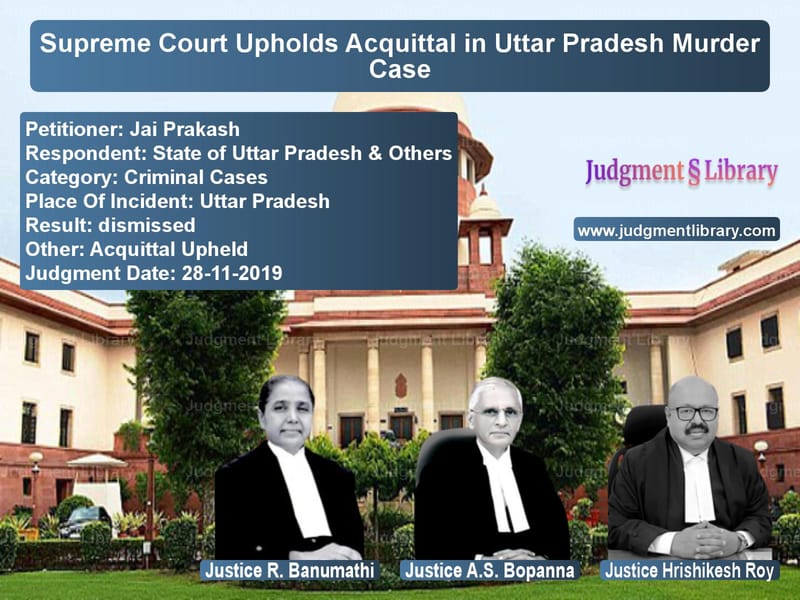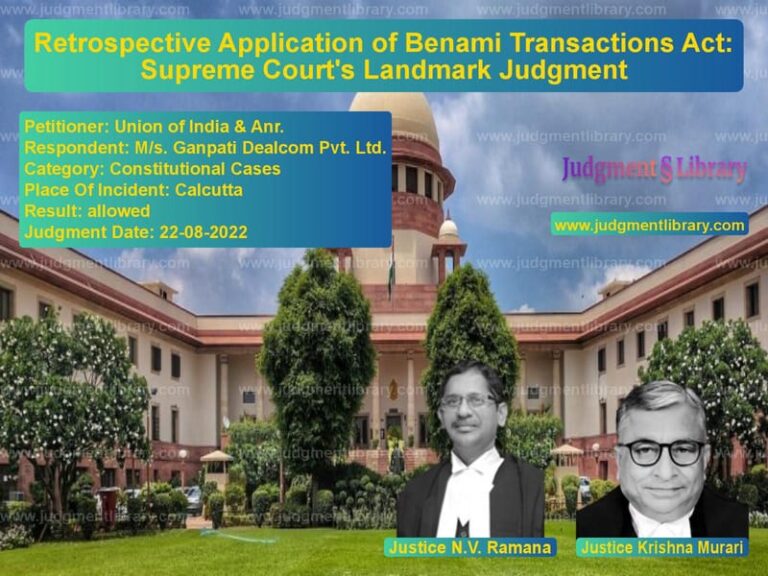Supreme Court Upholds Acquittal in Uttar Pradesh Murder Case
The Supreme Court of India, in its judgment dated November 28, 2019, upheld the acquittal of three accused in a 1992 murder case from Uttar Pradesh. The case, Jai Prakash vs. State of Uttar Pradesh & Others, centered on the murder of Ravi Prakash, allegedly due to prior enmity. The ruling emphasizes the importance of scrutinizing eyewitness testimonies and forensic evidence in criminal trials.
Background of the Case
The case was initiated when the prosecution alleged that on November 17, 1992, at approximately 9:00 AM, Ravi Prakash was shot dead near a flour mill owned by one of the accused, Shankar Teli. Witnesses, including the deceased’s brother, Jai Prakash, and a resident named Ajay Kumar, stated that three accused—Bhupendra Yadav, Raju Teli, and Lallu @ Lal Diwan—ambushed Ravi Prakash and fired multiple shots at him. The victim succumbed to his injuries on the spot.
The prosecution argued that the motive for the crime was past enmity between Ravi Prakash’s family and the accused, particularly Bhupendra Yadav, who allegedly harbored resentment due to negative media coverage about his illegal activities.
Key Legal Issues
- Whether the High Court was correct in overturning the trial court’s conviction of the accused.
- Whether the prosecution’s reliance on eyewitness testimony was sufficient to sustain a conviction.
- Whether forensic evidence corroborated the prosecution’s case.
- Whether the delay in filing the FIR impacted the credibility of the prosecution’s case.
- Whether circumstantial evidence should be prioritized over witness statements in cases with contradictory testimonies.
Analysis of Eyewitness Testimonies
The trial court relied on eyewitness testimonies to convict the accused, but the High Court found inconsistencies in their statements. The Supreme Court closely examined the following:
- Two witnesses provided conflicting statements about their whereabouts at the time of the murder.
- The timing of events in the FIR did not align with the testimonies given in court.
- There was no corroboration of the witnesses’ accounts through independent records such as mobile phone locations or CCTV footage.
Forensic Evidence and Its Contradictions
Forensic evidence played a critical role in the acquittal of the accused. Key forensic inconsistencies included:
- The ballistics report could not conclusively establish that the bullets found in the victim’s body were fired from the accused’s weapon.
- Gunshot residue tests on the accused came back negative, despite claims that they fired at close range.
- Autopsy results indicated that the angle of bullet entry did not match the prosecution’s narrative.
- No shell casings were recovered from the crime scene, raising doubts about the number of shots fired.
Delay in Filing the FIR
The defense raised concerns about the delay in filing the First Information Report (FIR). The Supreme Court observed:
- The FIR was lodged six hours after the murder, raising doubts about its authenticity.
- Such delays allow for potential fabrication of witness accounts and alteration of the case’s narrative.
- The court found that inconsistencies in the timing of the complaint further weakened the prosecution’s case.
Supreme Court’s Observations
- The accused cannot be convicted solely on suspicion or probability.
- The inconsistencies in witness statements raised reasonable doubt.
- The prosecution failed to explain why key forensic evidence did not match the narrative presented in court.
- The burden of proof in criminal cases lies entirely with the prosecution, and failure to eliminate reasonable doubt must result in acquittal.
Judicial Precedents Considered
The Supreme Court referenced key precedents while delivering its judgment:
- Sharad Birdhichand Sarda vs. State of Maharashtra (1984): Stated that circumstantial evidence must form a complete chain leading to the conclusion of guilt.
- Krishna Pillai vs. State of Kerala (1981): Highlighted that conviction should not be based solely on testimonies of interested parties.
- State of Rajasthan vs. Teja Ram (1999): Ruled that benefit of the doubt must be given to the accused when inconsistencies exist in the prosecution’s case.
Final Judgment
The Supreme Court upheld the High Court’s decision to acquit the accused, ruling that the prosecution failed to prove its case beyond a reasonable doubt. The judgment reaffirmed that the presumption of innocence must prevail unless guilt is conclusively established.
Impact of the Judgment
- Reinforces the Presumption of Innocence: Affirms that conviction requires conclusive proof beyond reasonable doubt.
- Scrutiny of Witness Testimonies: Encourages lower courts to critically analyze the credibility of witnesses.
- Encourages Scientific Evidence: Highlights the necessity of forensic corroboration in criminal trials.
- Sets a Precedent for Delayed FIRs: Recognizes that delays in lodging complaints can weaken cases.
Conclusion
The Supreme Court’s ruling in Jai Prakash vs. State of Uttar Pradesh is a landmark decision reaffirming the importance of fair trials, forensic scrutiny, and evidentiary consistency. By upholding the acquittal, the court underscored the necessity of establishing guilt beyond a reasonable doubt, setting a precedent for future cases reliant on conflicting witness testimonies and forensic inconsistencies.
Petitioner Name: Jai Prakash.Respondent Name: State of Uttar Pradesh & Others.Judgment By: Justice R. Banumathi, Justice A.S. Bopanna, Justice Hrishikesh Roy.Place Of Incident: Uttar Pradesh.Judgment Date: 28-11-2019.
Don’t miss out on the full details! Download the complete judgment in PDF format below and gain valuable insights instantly!
Download Judgment: Jai Prakash vs State of Uttar Prade Supreme Court of India Judgment Dated 28-11-2019.pdf
Direct Downlaod Judgment: Direct downlaod this Judgment
See all petitions in Murder Cases
See all petitions in Bail and Anticipatory Bail
See all petitions in Fraud and Forgery
See all petitions in Custodial Deaths and Police Misconduct
See all petitions in Judgment by R. Banumathi
See all petitions in Judgment by A. S. Bopanna
See all petitions in Judgment by Hrishikesh Roy
See all petitions in dismissed
See all petitions in Acquittal Upheld
See all petitions in supreme court of India judgments November 2019
See all petitions in 2019 judgments
See all posts in Criminal Cases Category
See all allowed petitions in Criminal Cases Category
See all Dismissed petitions in Criminal Cases Category
See all partially allowed petitions in Criminal Cases Category







